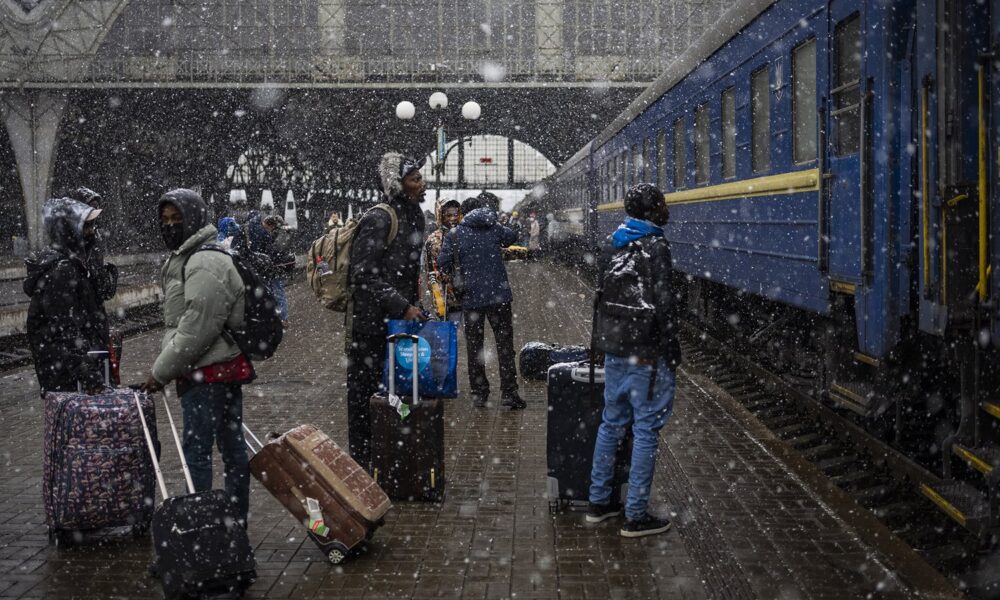A month ago, I opened my social media only to be met with a flood of panicked posts. Ranging from tweets to reels and everything in between, the message was the same: How unbelievable it was that our generation was experiencing live coverage of war––a statement with which I did not exactly resonate. My earliest memories of hearing about ongoing war were stories of resistance during the Gaza siege, in particular that of Rachel Corrie, an American student who was crushed by an Israeli bulldozer while peacefully protesting the attempted demolition of a Palestinian family’s home. Even though I remember hearing about this incident at the age of eight, it actually happened five years prior, in 2003––a stark reminder of the decades of conflict and war that have been happening in our lifetime and covered by civilians on social media in the absence of Western coverage.
Politicians and media figures’ attempts to garner sympathy for Ukrainian people by describing their “blonde hair and blue eyes” dragged many racialized people into the middle of the coverage of a war unrelated to them. This media attention did not portray the conflict in Ukraine as the latest addition in a long list of recent tragic wars and conflicts, but rather tried to emphasize that it was different.
No one deserves to have their country attacked, to be forced to leave their homes, or to lose their loved ones violently. Yet, many in the media and in politics revealed a racial bias when they attempted to explain why the Ukrainians deserved it even less.
Elevating Ukrainians above others under similar circumstances of displacement and war by describing them such as “civilized,” “intelligent,” and “educated” has exposed the dangerous, racist tendencies to further marginalize non-Western people. Other statements, however, were overtly ludicrous, with some claiming Ukrainians were less deserving of war because they were “well-dressed,” had access to “Netflix and Instagram,” or had similar “cars.” This dehumanization of people in Africa, Asia, and the Middle East not only normalizes their tragedies but facilitates their continued suffering. The insistence that those in the West are more advanced and educated than those in “developing countries” has been used in the past to justify colonialism and American military invasions of countries such as Afghanistan and Iraq—both of which were justified under the guise of “civilizing” the populations living there.
Coverage of Ukrainian civilians learning to use guns and creating molotov cocktails depict them as heroes fighting for their country. However, in recent decades, Palestinians and other racialized people worldwide have been dubbed as “terrorists” for doing the same. The simultaneous glorification of white people and condemnation of people of colour who engage in armed resistance reminds us who has the right to defend themselves.
Biases do not just affect our perceptions, they also affect our policies: They dictate who gets to flee a warzone. Consider the African and South Asian students fleeing the Ukrainian crisis, who are struggling to find transportation and being denied entry at the Polish border. This treatment is reminiscent of how racialized refugees and immigrants have been treated—as criminals and “aliens” who threaten Western culture.
Beyond blatant racism comes ignorant and incorrect media coverage. In the early days, people circulated videos of airstrikes in Gaza falsely identifying them as Ukrainian. The claim that we have not been privy to a war or conflict of this scale before serves as nothing more than an erasure of the tragedies suffered by a long list of countries including Yemen, Libya, Ethiopia, and Nigeria.
No one is immune from the harms of this selective empathy. For Ukrainians, where the conversation should centre their suffering, criticisms of media hypocrisy and comparison with other conflicts have become dominant.
If there is anything that facing a pandemic together should have taught us, it is compassion. Being apathetic about war and conflicts is a privilege not afforded by all. In one part of the world, children are labelled as terrorists and killed for defending themselves against occupying forces, or have to walk 1,000 kilometers to escape a warzone, while those in another part of the world are making memes about war. With a wealth of information at our fingertips and the biases in media well-known and well-documented, it is inexcusable to be ignorant to human tragedies.








